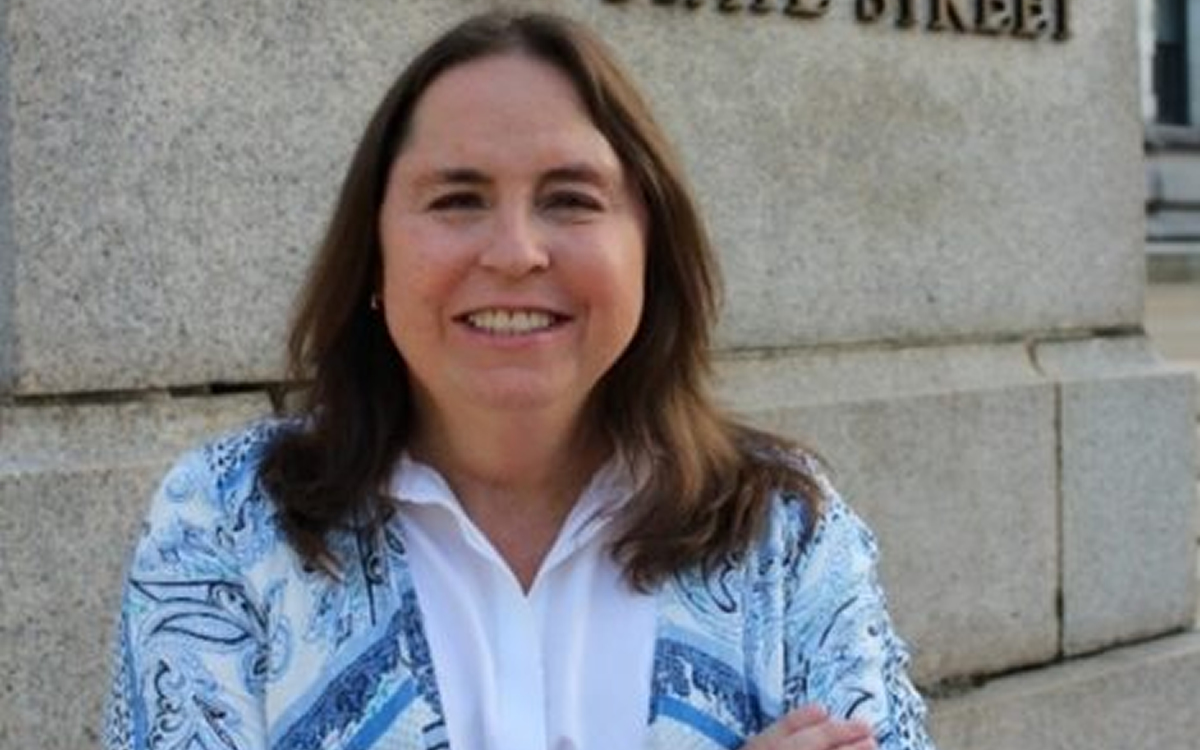Politics
State and local LGBTQ elected officials detail how they battle hate
LGBTQ Victory Fund endorsed many out candidates in 2022.

Just a few months ago, the midterm elections saw a “rainbow wave” with a record-breaking number of LGBTQ candidates elected to public office across the country.
After statehouses and city councils and other legislative bodies opened for new business, however, within weeks it became clear that Americans can expect to see a greater number of anti-LGBTQ bills and policies in 2023 than were introduced in any year in recent memory.
Five LGBTQ officials, both newly elected and reelected, recently connected with the Washington Blade to discuss their observations from the campaign trail and experiences in elected office. They shared reactions to the spate of harmful proposals that have been introduced so far and detailed plans for advancing pro-equality legislation while fighting against anti-LGBTQ policies this year and beyond.
New Hampshire State Rep. Gerri Cannon talked with the Blade earlier this month, and newly elected Trenton (N.J.) City Councilwoman Jennifer Williams responded to written questions last week. First-time officeholders Montana state Rep. Zooey Zephyr and Connecticut State Treasurer Erick Russell, along with returning Colorado Senate Majority Leader Dominick Moreno, each sat down with the Blade last month during the International LGBTQ Leaders Conference in D.C.
The conference was hosted by the LGBTQ Victory Institute, which administers programs and trainings for elected leaders whose campaigns are supported by the LGBTQ Victory Fund political action committee. Former Houston Mayor Annise Parker, who serves as president of the LGBTQ Victory Fund and Institute, also talked to the Blade earlier this month.
So diverse are the identities, backgrounds, experiences and political views of these officeholders that they shatter restrictive notions that LGBTQ candidates must fit into a certain mold or serve only in certain elected positions.
How were they treated on the campaign trail?

Zephyr, who became the first openly transgender person elected to the deep-red Montana Legislature, told the Blade she was nervous about the prospect of knocking on doors for the first time.
“There’s always that fear as a trans person that it only takes one scary moment,” she said. “But what I found was what I always knew: My community supported me and loved me.”
Many of Zephyr’s constituents, she said, “were excited to see me and to be talking to a trans woman about policy,” as well as LGBTQ issues. Many voters were eager to get into substantive discussions on topics as wonky as how policies concerning solar power might intersect with local unionization efforts, she said.
“What I saw in my community, and what I’ve seen, broadly, across Montana, is first and foremost kindness and community,” Zephyr said.
Russell, who with his election for Connecticut treasurer became the first gay Black man to serve in statewide office, said his constituents were “excited about the fact that they felt they were represented in a campaign” with many voters relating to Russell’s “humble beginnings.”

Voters were also heartened to see a younger candidate running, said Russell, who earned his bachelor’s degree in 2009 and graduated from law school at the University of Connecticut in 2012.
His identity aside, “at the end of the day, we were running a campaign that was built on substance,” he said. And “people want to know that they’re going to have advocates for their communities.”
Likewise, Cannon told the Blade, “I don’t use my status as being a trans person as a lever in most cases. I’m fighting for people in my community; I’m there to do the people’s business, and I just happen to be transgender.”

“I haven’t run into anyone that’s used my status as a trans person during an election cycle,” said Cannon, who has served in the New Hampshire Legislature since 2018.
“When I ran for City Council here in Trenton,” Williams said by email, we “probably knocked on 3-4,000 doors and spoke with all kinds of people.” The questions she and her team received concerned crime, jobs, public utilities like water and roads, and Williams’ ability to work constructively with other councilmembers, she said.

Williams, who recently became Trenton, N.J.’s first LGBTQ city council member and is the one of the state’s first openly transgender officeholders, said that voters did not ask about her gender identity or sexual orientation, nor did they bring up politically divisive topics like policies concerning the participation of trans athletes in school sports leagues or drag queen story hours.
Likewise, since her election to the city council, Williams’ Council colleagues who have been sworn in as well as her at-large colleagues who won their runoff elections last Tuesday have been supportive — “very much so,” she told the Blade.
At the same time, Williams said she encountered some challenges because of her being a Republican. It “has been an issue with some people who are beyond my immediate circle or who haven’t gotten a chance to know me and support me,” she said.
“Some of my biggest supporters are very well-known local Democrats because they have seen the LGBTQ advocacy work and civic involvement that I have done in the past,” Williams said. “They also have very good ‘ears to the ground’ and trust me, people would tell them if I had come to canvass their neighborhood and if they spoke with me.'”
Williams expressed gratitude for the “endorsement and support” she received for her candidacy from the Victory Fund as well as for her progressive and Democrat supporters, because “they took a chance on believing in me and stuck with me even when they caught some hell for doing so.”
How will they approach challenging colleagues or difficult political circumstances?
Parker told the Blade there is room for LGBTQ elected officials to make a positive impact even in the most challenging of circumstances.
“We are just as interested in seeing them be who they are and stand up and speak out in their legislatures — whether or not they can pass pro-equality legislation,” she said.
When passing pro-equality policy or batting away harmful policy is difficult, Zephyr said she expects to draw from some of the lessons she learned as an athlete: “if you put in the work, day in and day out, you will see the progress. If you trust that process and do the work, you’ll see the results.”
Most people have nuanced opinions on policy matters and are sincere in their convictions, including legislators who might not support pro-equality bills or the LGBTQ community, she said. “And I trust that if I go into those conversations, — I would even say most — of them” will engage in good faith. “To me, that’s how you change hearts and minds.”
Earlier this month, the Montana Free Press reported that during a sausage making party for Montana lawmakers, Zephyr was caught chatting amicably with Billings Republicans. She later told reporters that she enjoyed the chance to connect with her colleagues outside the Capitol building “to just hang out and talk to someone about where they grew up.”
There can often be more room for diversity, including ideological diversity, among candidates elected to state legislatures because these bodies are typically governed less by the strictures of calcified partisan politics that are difficult to overcome at the national level, Moreno told the Blade.

“It’s vastly more personal,” he said, which means “you do see a lot more cross-party collaboration” in the Legislature.
With his first election to public office in 2012, Moreno, who is gay, became one of the four LGBTQ members of the Colorado House of Representatives elected to serve that year, which was hailed by the Denver Post as “a historic first for gays.”
Zephyr and Moreno both discussed how hateful and vitriolic rhetoric informs the development and passage of harmful laws and policies — all factors that raise the likelihood of violence against LGBTQ and particularly trans people.
The painful reality of violence against the community was a top of mind for the officeholders as well as the organizers and attendees of the International LGBTQ Leaders Conference, which fell just a couple of weeks after a gunman killed five people and injured 25 in Club Q, a Colorado Springs, Colo., LGBTQ nightclub.
Moreno recalled that when he first joined the Colorado Legislature 10 years ago, as he and his colleagues were debating a bill concerning conversion therapy, “some Republican members associated being LGBTQ with being an alcoholic.”
“I took an opportunity to have a conversation with them to let them know how offensive that rhetoric is,” Moreno said. “What I think the Club Q tragedy will do is remind people to be more careful with their language, because I do think that the kind of very hateful rhetoric we’re seeing today has played a role in the instigation of violence against minority communities.”
There are some extreme state legislators in New Hampshire, Cannon said, noting last year’s proposal by Republicans to secede (in the language of the bill, New Hampshire “peaceably declares independence” from the U.S. “and proceeds as a sovereign state.”)
Asked whether these lawmakers are a “lost cause,” Cannon did not hesitate: “I would absolutely use that term,” she said, comparing them to committed anti-vaccine conspiracy theorists. “They really don’t care for LGBT people; they don’t want to learn.”
However, Cannon said, “I’ve talked to Republicans who are favorable who have gotten to know trans people in the Legislature.”
Russell stressed the importance of representation: “I think the important piece is electing folks to office who are committed to fighting for our values.”
For her part, Williams joins the City Council at an interesting juncture. Following a series of ugly incidents in which previous members displayed “anti-LGBTQ bigotry and anti-Semitism,” a few years ago, “our city was crying for new start and a new City Council that would welcome, respect and affirm everyone,” she said.
Williams added that while she hopes Trenton will never again face that kind of scandal — partly because it happened when the members were working remotely and in-person meetings tend to discourage officeholders from making hateful comments to each other — “I am confident that all six of my colleagues will have my back if anything happens.”
How are they approaching policy that impacts LGBTQ constituents?
In the legislature, consistent with the approach she has employed in her prior work as an activist, Zephyr said she expects to focus her work on “making sure that we are taking action behind the scenes” to make sure each measure carrying a pro-equality message also carries a pro-equality impact.
For example, she said, passing a nondiscrimination ordinance is commendable, but when residents have cause to file a complaint, is there an accessible and effective means for them to do so?
Among the work Zephyr has done since she was seated has been the introduction of bills to ban the “gay and trans panic defense” and protect same-sex adoptive parents. She has also been a vocal critic of her Republican colleagues’ move to table Democrats’ proposal to allow police to temporarily take firearms from those deemed by a court as a danger to themselves or others.
The Club Q shooting provides for the opportunity for Colorado to build upon its already strong gun safety laws, such as by passing an assault weapons ban and achieving universal implementation of the state’s “red flag law,” Moreno told the Blade, adding that “we’re going to explore some of that in this next [now current] legislative session.”
Democratic state lawmakers in Colorado introduced an assault weapons earlier this month. With expanded Democratic majorities in both chambers of the state legislature serving with Democratic Gov. Jared Polis, who is gay, the state is in a position to pass more progressive legislation across the board, Moreno said.
In New Hampshire, Cannon has proposed a bill to make it easier for residents to change the sex listed on their birth records, having previously introduced the proposal to allow for people to change the sex listed on their driver’s licenses and state-issued IDs with the option to check a box for “nonbinary.” Republican Gov. Chris Sununu signed that bill into law and it went into effect in 2020.
Despite his support for that proposal, Cannon said Sununu pushed back against a previous version of her birth records bill because it had included an option to identify as nonbinary. She told the Blade she has reintroduced the measure this year without that provision, with the expectation that its success will provide for an opportunity to make it more inclusive in the future.
In her position on the school board, too, where until recently she served concurrently, Cannon focused her approach on working towards incremental change — voting, for instance, for a proposal that allows students to use restrooms and facilities that align with their gender identities even though it requires parental permission, therefore excluding trans students who are not out and supported at home.
“Getting that policy in place will open the door in the future” for a more inclusive policy, Cannon said.
Another bill introduced by Cannon, which was modeled after California’s, would make New Hampshire a sanctuary for LGBTQ families to escape prosecution in states that have criminalized parents for facilitating their children’s access to medically necessary and guideline directed medical treatments for gender dysphoria.
Parker noted that these types of bills were a major topic discussed by LGBTQ legislators when they convened for programs hosted by the Victory Institute.
Republicans, meanwhile, including Cannon’s GOP colleagues, are continuing to advance proposals to outlaw healthcare for minors for the treatment of gender dysphoria.
“I’m speaking out against the [GOP’s] healthcare bill, flagging it as discriminatory and in violation of HIPPA rights,” Cannon said, referring to the Health Insurance Portability and Accountability Act, which prohibits the disclosure of sensitive health information without the patient or guardian’s consent or knowledge.
“You have to be able to use medical information to prosecute a family [for facilitating access to gender affirming healthcare],” Cannon said, adding constitutional issues might also be raised under the Fifth Amendment’s protection against self-incrimination.
Cannon is confident she will be able to convince enough of her Republican colleagues to table the bill so it never reaches a vote, adding that she expects Sununu would veto the proposal should it ever reach his desk.
Others see room to leverage their backgrounds to make positive impacts elsewhere
Williams told the Blade that apart from bringing back Pride weekend celebrations that were on pause during the pandemic, Trenton does not have any LGBTQ-specific policy matters on the horizon.
“I think that is due to our being the capital of a very protective state that has strong LGBTQ protections written into law,” she said.
At the same time, she said, “my lived experience as a LGBTQ person informs me in many ways that correlate with the experiences of other marginalized groups,” Williams said.
“From issues ranging from youth homelessness to economics to law enforcement, LGBTQ people can bring much to government and its decision-making that can benefit everyone,” she said.
Likewise, Russell said, “being an advocate for LGBTQ rights and issues is going to be something that I will continue to do in my role” as treasurer. “But I think the there are opportunities for there to be overlap with a lot of different things.”
For instance, the attacks on LGBTQ rights come alongside efforts to abridge women’s reproductive freedoms. “One of the policies that I built through the campaign and worked with some legislators and nonprofits on was the creation of a safe harbor fund within the treasurer’s office,” Russell said.
“It would ultimately be a fund that we would put in place, and it would be used to help individuals traveling from anti-choice states who needed to access safe reproductive health care,” he said.
Other matters on Russell’s agenda will impact all residents in Connecticut, policies like “baby bonds, which was passed in our Legislature,” and will provide publicly funded trust accounts for every new child. Another priority is “expanding financial literacy programs so that we [will] have young folks who are coming out of school who know how to manage money,” he said.
Anti-LGBTQ bills, motivated by prejudice, will help no one
Whatever their putative purpose might be, Cannon stressed that the impact of anti-LGBTQ legislation proposed by her colleagues is often a solution in search of a problem — a message that was echoed by Parker and Williams.
“In New Hampshire, the trans population is one-tenth of one percent,” she said. Nevertheless, “We have people trying to put forth legislation against the trans community when we’re such a small community of people.”
Likewise, regarding the debate over her proposal to allow residents to change the gender listed in their birth records, Cannon said, “the number of people born in the state who want to change their birth records is incredibly small,” while, “many of us who were born outside the state already had our information changed.”
Zephyr stressed the ways in which anti-LGBTQ bills are based on lies about LGBTQ people.
She pointed to a proposal in the Montana Legislature that would prohibit minors from attending drag shows, which comes from the baseless smear propagated on the right that organizers of and participants in all-ages drag performances are sexually abusing or exploiting children.
Bills like these are “not a matter of logic or facts or information,” Parker told the Blade, but rather are intended as politically motivated attacks on the LGBTQ community. It’s “political theatre” cooked up by “right wing think tanks that circulate these bills to legislators around the country,” she said.
Russell noted how unpopular these policies are, broadly speaking. “Republicans are really using these campaigns to target trans kids, for instance, or to create these kinds of social wars around issues that the large majority of Americans believe that people should have the freedom and right to be who they are, and love who they love, and express themselves how they want to,” he said.
Williams sees both political opportunism and sincere bigotry motivating these anti-LGBTQ proposals: “There is definitely some hard-core prejudice behind some of these bills, but for many of these bills’ sponsors I believe they feel that they have put forth anti-LGBTQ legislation because they think they need to do so for their ‘conservative street cred’ and to raise money or gain a few percentage points in a primary.”
“There are definitely some Republican legislators who believe their legislation will solve problems that don’t exist,” Williams said. “I also learned that there are more moderate Republicans willing to push against such bad legislation, but they need support to help defend themselves when they get attacked for supporting LGBTQ people and in particular, trans kids.”
Parker has had first-hand experience dealing with anti-LGBTQ legislation when serving as mayor of Houston from 2010-2016, during which time, as an out lesbian, she was one of the first openly LGBTQ mayors of a major U.S. city.
In 2015, when voters repealed a broad nondiscrimination ordinance that included sexual orientation and gender identity, “it was about fear,” Parker said, stoked in large part by “the smear that trans women are sexual predators.”
She added that the effect of anti-LGBTQ bills can be both harmful and performative at the same time, pointing to efforts by conservative lawmakers to ban books that contain LGBTQ characters or themes.
“We [in the the LGBTQ community] have fought so hard to have affirming depictions of our lives in books and other media, so, to have books about LGBT lives removed from school libraries is really frustrating,” Parker said.
Particularly after the bills addressing “performative culture war stuff,” including book bans, are signed into law, she said, it often becomes clear that their proponents had failed to consider what that their implementation will look like in practice, perhaps in many cases because they did not expect the proposals to succeed in the first place.
From anti-LGBTQ laws to the onerous abortion restrictions that have been passed by many conservative states, GOP legislators are discovering the unintended and unforeseen consequences of poorly-construed policies and suffering the backlash from voters, Parker said. “It’s like the dog who chased the car.”

Politics
Court records raise concerns about right-wing TikTok investor’s influence
Jeff Yass is a Pa. billionaire who has funded anti-LGBTQ causes

The role played by Pennsylvania billionaire Jeff Yass in the creation of TikTok might be far greater than was previously understood, according to new reporting that raises questions about the extent of the right-wing megadonor’s influence over matters at the intersection of social media, federal regulations, and electoral politics.
In 2012, Yass’s firm, Susquehanna International Group, spent $5 million for 15 percent of the short-form video hosting platform’s Chinese-owned parent, ByteDance. In the years since, as TikTok grew from a nascent startup to a tech giant with 1.5 billion active monthly users and an estimated $225 billion valuation, Yass and his firm pocketed tens of billions of dollars.
Beyond the size of Susquehanna’s ownership stake, little was known about its relationship with ByteDance until documents from a lawsuit filed against the firm by its former contractors were accidentally unsealed last month, leading to new reporting by the New York Times on Thursday that shows Susquehanna was hardly a passive investor.
In 2009 the firm used a proprietary, sophisticated search algorithm to build a home-buying site called 99Fang, tapping software engineer and entrepreneur Zhang Yiming to serve as its CEO. The company folded. And then, per the Times’s review of the court records, in 2012 Susquehanna picked Yiming to be the founder of its new startup ByteDance and repurposed the technology from 99Fang for use in the new venture.
Importantly, the documents do not provide insight into Yass’s personal involvement in the formation of ByteDance. And Susquehanna denies that the company’s search algorithm technologies were carried over from the real estate venture — which, if true, would presumably undermine the basis for the lawsuit brought by the firm’s former contractors who are seeking compensation for the tech used by ByteDance.
Questions about Yass’s influence come at a pivotal political moment
In recent weeks, federal lawmakers have moved forward with a proposal that would force ByteDance to divest TikTok or ban the platform’s use in the U.S. altogether, citing the potential threats to U.S. national security interests stemming from the company’s Chinese ownership.
The bill was passed on March 13 with wide bipartisan margins in the House but faced an uncertain future in the Senate. However, on Wednesday, House Speaker Mike Johnson (R-La.) announced plans to fold the proposal into a measure that includes foreign aid to Ukraine, Israel, and Taiwan, likely bolstering its chances of passage by both chambers.
Last month, shortly after meeting with Yass at his home in Mar-a-Lago, former President Donald Trump changed his longtime stance and came out against Congress’s effort to break up or ban TikTok. The timing led to speculation about whether the billionaire businessman was behind Trump’s change of heart, perhaps by contributing to the cash-strapped Republican presidential nominee’s electoral campaign or through other means.
Meanwhile, Yass has emerged as the largest donor of the 2024 election cycle. A coalition of public interest and government watchdog groups have called attention to the vast network of right-wing political causes and candidates supported by the billionaire, often via contributions funneled through dark money PACs that are designed to conceal or obscure the identities of their donors.
The Action Center on Race and the Economy, Make the Road, POWER Metro: Faith in Action, Free the Ballot, and Little Sis launched a website called All Eyes on Yass that features research into the various causes he supports, along with insight into the networks connecting the entities funded by his contributions.
Broadly, in Pennsylvania they fall into five categories: Advocacy against reproductive freedom and LGBTQ rights via the Pennsylvania Family Institute, lobbying on behalf of oil and gas industry interests by the Pennsylvania Manufacturers’ Association, anti-union groups supported by Commonwealth Partners, a privately owned registered investment advisory firm/independent broker-dealer, the Commonwealth Foundation for Public Policy Alternatives, which seeks to privatize public schools and defeat proposed increases to the minimum wage, and the Citizens Alliance of Pennsylvania, which advocates for lowering taxes on corporations and the rich.
Additionally, All Eyes on Yass reports that the billionaire has given massive contributions to Club for Growth and direct spending to support the electoral campaigns of right-wing Republicans including Florida Gov. Ron DeSantis; U.S. Sens. Ted Cruz (Texas), Rand Paul (Ky.), and Josh Hawley (MO); U.S. Rep. Lauren Boebert (Colo.), and former U.S. Rep. Madison Cawthorn (N.C.).
Congress
Lawmakers champion drug policy reforms at National Cannabis Policy Summit
Congressional leaders pledged their support for decriminalization

Speaking at the 2024 National Cannabis Policy Summit on Wednesday, congressional leaders pledged their support for proposals to remedy the harms of America’s War on Drugs while protecting cannabis users and cannabis businesses that are operating under a fast-evolving patchwork of local, state, and federal laws.
Overwhelmingly, the lawmakers who attended the conference at the Martin Luther King Jr. Memorial Library in D.C. or delivered their remarks virtually were optimistic about the chances of passing legislative solutions in the near-term, perhaps even in this Congress.
Participants included U.S. Sens. Raphael Warnock (D-Ga.), Jeff Merkley (D-Ore.), Elizabeth Warren (D-Mass.), and Senate Majority Leader Chuck Schumer (D-N.Y.), along with U.S. Reps. Eleanor Holmes Norton (D-D.C.), Earl Blumenauer (D-Ore.), and Barbara Lee (D-Calif.), who co-chairs the Congressional Cannabis Caucus and was honored at the event with the Supernova Women Cannabis Champion Lifetime Achievement Award. Republicans included an aide for U.S. Rep. David Joyce (R-Ohio) who was featured in an afternoon panel discussion about the cannabis policy landscape on Capitol Hill.
Each of the members have long championed cannabis-related policy reforms, from Merkley’s SAFER Banking Act that would allow cannabis businesses to access financial services (thereby affording them the critically important protections provided by banks) to Lee’s work throughout her career to ameliorate the harms suffered by, particularly, Black and Brown communities that have been disproportionately impacted by the criminalization of marijuana and the consequences of systemic racism in law enforcement and the criminal justice system.
The lawmakers agreed America is now at an inflection point. Democratic and Republican leaders are coming together to support major drug policy reforms around cannabis, they said. And now that 40 states and D.C. have legalized the drug for recreational or medical use, or both, the congress members stressed that the time is now for action at the federal level.
Last summer, the U.S. Department of Health and Human Services issued a formal request to re-categorize marijuana as a Schedule III substance under the rules and regulations of the Controlled Substances Act, which kicked off an ongoing review by the Biden-Harris administration. Since the law’s enactment in 1971, cannabis has been listed as a Schedule I substance and, therefore, has been subject to the most stringent restrictions on and criminal penalties for its cultivation, possession, sale, and distribution.
Merkley acknowledged that re-scheduling would remedy the Nixon administration’s “bizarre” decision to house marijuana under the same scheduling designation as far more harmful and addictive drugs like heroin — and noted that the move would also effectively legalize biomedical research involving cannabis. However, the senator said, while re-scheduling “may be a step in the right direction, it’s not de-scheduling” and therefore would not make real inroads toward redressing the harms wrought by decades of criminalization.
Likewise, as she accepted her award, Lee specified that she and her colleagues are “working night and day on the legalization, not re-scheduling.” And her comments were echoed by Warren, who proclaimed in a prerecorded video address that “de-scheduling and legalizing cannabis is an issue of justice.”
Congressional Republicans have blocked legislation to legalize marijuana, the Massachusetts senator said, “and that is why the scheduling is so important,” as it might constitute a “tool that we can use to get this done without Republican obstruction.”
Warren, Merkley, and Schumer were among the 12 Senate Democrats who issued a letter in January to the U.S. Drug Enforcement Administration requesting transparency into its re-scheduling process while also, more importantly, demanding that the agency fully de-schedule cannabis, which would mean the drug is no longer covered by the Controlled Substances Act.
However, in a possible signal of political headwinds against these efforts, their Republican colleagues led by U.S. Sen. Mitt Romney (R-Utah) responded with a letter to DEA Administrator Anne Milgram “highlighting concerns over HHS’s recommendation to reschedule marijuana from a Schedule I to Schedule III-controlled substance.” The GOP signatories, all of whom serve on the Senate Foreign Relations Committee, also sought to “underscore the Drug Enforcement Administration’s (DEA) duty under the Controlled Substances Act (CSA) to ensure compliance with the United States’ treaty obligations under the Single Convention on Narcotic Drugs.”
As Norton noted during her prepared remarks, elected Democrats are not necessarily always on the same page with respect to expanding access to economic opportunity facilitated by cannabis. For instance, though President Joe Biden had promised, during his State of the Union address this year, to direct his “Cabinet to review the federal classification of marijuana, and [expunge] thousands of convictions for mere possession,” Norton blamed Biden along with House Republicans for provisions in the federal budget this year that prohibit D.C. from using local tax dollars to legalize cannabis sales.
A non-voting delegate who represents the city’s 690,000 residents in the House, Norton called the president’s position “deeply disappointing,” particularly considering his record of supporting “D.C. statehood, which would allow D.C. to enact its own policies without congressional interference” and grant its residents voting representation in both chambers of Congress. She added that the majority of Washingtonians are Black and Brown while all are held responsible for “the obligations of citizenship including paying federal taxes.”
Norton said the city should also have the power to grant clemency for crimes committed in the District, including cannabis-related crimes — power that, currently, can only be exercised by the president.
Some Republican lawmakers have been at the forefront of efforts to reform harmful cannabis regulations. For instance, a participant in a mid-afternoon panel pointed to the CURE Act, a bill introduced by U.S. Reps. Nancy Mace (R-S.C.) and Jamie Raskin (D-Md.) that would prohibit the federal government from denying security clearances based on applicants’ past or current use of cannabis.
While securing statehood for D.C. and de-scheduling cannabis via legislation or administrative action are perhaps, at least for now, a heavy lift, Merkley pointed to promising new developments concerning his SAFER Banking Act.
The Oregon senator first introduced the measure, then titled the SAFE Banking Act, in 2019, and he said the legislation’s evolution into its current iteration was difficult. “Regulators don’t want to be told what to do,” Merkley said, and negotiations with these officials involved “nitty-gritty arguments over every word.”
Pushback also came from one of Merkley’s Democratic colleagues. In September, Warnock, who is Georgia’s first Black U.S. senator, voted “no” on the 2023 version of the SAFER Banking Act, writing: “My fear is that if we pass this legislation, if we greenlight this new industry and the fees and the profits to be made off of it without helping those communities” most harmed by the War on Drugs “we will just make the comfortable more comfortable.”
Warnock’s statement followed his pointed remarks expressing concerns with the legislation during a Senate Banking Committee hearing.
“Let me be very clear,” he said, “I am not opposed to easing or undoing federal restrictions around cannabis. And I would support all of the provisions and reforms in this legislation if paired with broader cannabis reforms that substantively address the issue of restorative justice. This bill does not do that.”
At this point, however, the latest version of the SAFER Banking Act has advanced out of committee and earned the support of Senate leaders including Schumer and much of the Republican conference.
“This is the moment,” he said. “Let’s not let this year pass without getting this bill — the safer banking bill — through the House, through the Senate, and on the president’s desk.”
In her remarks, Lee also discussed the importance of business and industry-wide reforms like those in Merkley’s bill.
“We have to make sure that the cannabis industry is viewed by everyone, especially our federal government, as a legitimate business,” Lee said. “Legitimate, which deserves every single aspect of financial services that any legitimate business deserves and has access to.”
Like Warnock, the congresswoman also highlighted how these financial and business considerations intersect with “equity issues,” as “those who have been most impacted by this horrible War on Drugs” must “become first in line for the businesses and for the jobs and for the economic opportunity the cannabis industry provides.”
Reflecting on her experience introducing the Marijuana Justice Act in 2019, which was Congress’s first racial justice cannabis reform bill, Lee remembered how “everyone was like, ‘why are you doing this? It’s politically not cool.’” Her legislation sought to end the federal criminalization of marijuana, expunge the criminal records of those convicted of cannabis-related crimes, and reinvest in communities that have suffered disproportionately from the War on Drugs.
The congresswoman said she explained to colleagues how the bill addressed “many, many layers” of often-intersecting problems linked to federal cannabis policy, telling them: “This is a criminal justice issue, a racial justice issue, an issue of equity, a medical issue, a veterans’ issue, and an issue of economic security.”
Two years later, with a 220-204 vote, the House successfully passed the Marijuana Opportunity Reinvestment and Expungement Act, a comprehensive bill introduced by U.S. Rep. Jerry Nadler (D-N.Y.) and to the Senate by then-U.S. Sen. Kamala Harris (D-Calif.). The measure included Lee’s Marijuana Justice Act.
“This bill is the product of many, many years of advocacy for federal cannabis reform and equity,” she said in a statement celebrating the bill’s passage. “Make no mistake: This is a racial justice bill. It’s about the thousands of people of color who sit in jail for marijuana offenses while others profit. It’s about finally repairing the harms of the War on Drugs on communities and families across the country.”
“We’ve come a long way,” she told the audience on Wednesday. “And now we have a long way to go.”
Politics
First lady warns Trump is ‘dangerous to the LGBTQ community’ at HRC event
Jill Biden spoke in Arlington, Va., on Friday

Delivering a keynote address at the Human Rights Campaign’s Equality in Action event Friday, First lady Jill Biden warned former President Donald Trump is “a bully” who is “dangerous to the LGBTQ community.”
Her appearance at the three-day volunteer and board gathering at the Sheraton Pentagon City in Arlington, Va., comes as part of the Biden-Harris reelection campaign’s “Out for Biden” program, which aims to “mobilize LGBTQ+ voters, communities, and leaders across the country.”
“Today, this community is under attack,” Biden said. “Rights are being stripped away. freedoms are eroding. More and more state laws are being passed targeting this community. Just last month, we had to fend off more than 50 anti-gay amendments that Republicans tried to force into the government funding bill.”
“These were extreme measures aimed directly at this community — measures that would have limited health care and weakened protections for same sex couples,” she said. “And they served only one purpose to spread hate and fear.”
In a nod to her long career as an educator, Biden said, “History teaches us that our rights and freedoms don’t disappear overnight. They disappear slowly. Subtly. Silently.”
She continued, “A book ban. A court decision. A ‘Don’t Say Gay’ law. One group of people loses their rights and then another. And another. Until one day you wake up and no longer live in a democracy … This is our chapter of history and it’s up to us how it ends.”
Biden then highlighted some of the advancements for LGBTQ rights secured under the Biden-Harris administration.
“Thanks to President Biden, marriage equality is now the law of the land,” she said. “He ended the ban on gay and bisexual men donating blood. He’s made it possible for trans Americans to serve openly and honorably in our military. And he’s standing firmly against conversion therapy.”
“Yes, there are forces outside these walls that are trying to erase these hard fought gains, trying to unwind all the progress that we’ve made,” Biden said. “They want to take our victories away, but we won’t let them. Your president will not let them — I will not let them.”
-

 Africa4 days ago
Africa4 days agoCongolese lawmaker introduces anti-homosexuality bill
-

 World4 days ago
World4 days agoOut in the World: LGBTQ news from Europe and Asia
-

 District of Columbia3 days ago
District of Columbia3 days agoReenactment of first gay rights picket at White House set for April 17
-

 Africa3 days ago
Africa3 days agoUgandan activists appeal ruling that upheld Anti-Homosexuality Act












